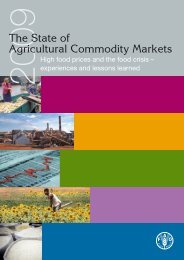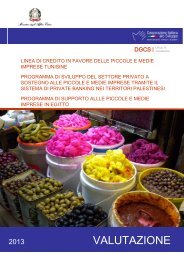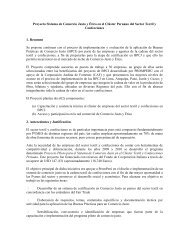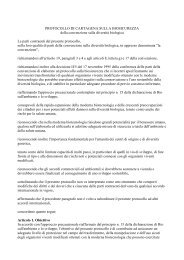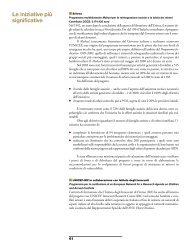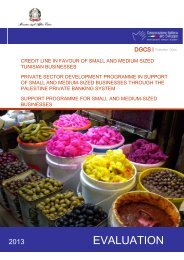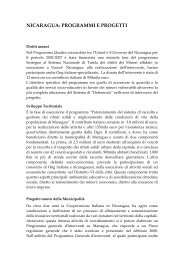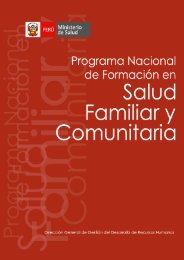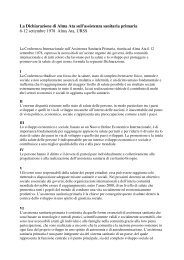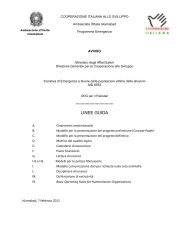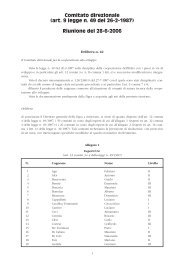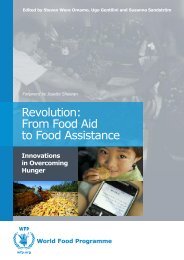The increase of information and awareness on the part of the girls alreadypresent on Italian territory, and the considerable number of those who leaveNigeria, means that these are becoming more difficult to manage by theorganisation of the madam.This is one of the reasons why since three or four years the recruiters prefer tocontact even younger girls coming from villages in the rural areas w<strong>here</strong> t<strong>here</strong> ismuch poverty, the information available is scarce and w<strong>here</strong> the ties represented bythe wodoo rituals are still very strong.“In Nigeria it is known, but the problem is that the pimps have changed theirideas, they no longer go to the city to get girls, they go to the small villages w<strong>here</strong>the story has not yet arrived” (Interview Victim No.4).“However t<strong>here</strong> is some that live in the country and who do not know what it isto make prostitution in Italy. So in these years pimps went to the country, to takethe girls to bring them <strong>here</strong>. Because in the country they don’t know that <strong>here</strong>prostitution is made” (Interview Victim No.8).These women are extremely weak subjects both from the cultural and materialpoint of view and t<strong>here</strong>fore easy to manage and subdue.The evidence collected by the operators agree that the active role is often that ofclose relations, the extended family or members of the community in the processwhich brings the victims to start along the road of the traffic and of prostitution.The relationship with the family appears frequently as a decisive step, even if thetype of pressure exerted on the victim is extremely variable.In some cases a decisive role is played by the mother of the girl who, althoughknowing the type of work offered to the daughter, reasons that the choice is madeout of the necessity that a member of the family sacrifices herself for the well beingof the entire family nucleus.In other cases it is the extended family that is the determining support andstimulus. For example the uncles and aunts, that is to say persons who are linkedby close ties or who frequent each other, to take on the function of the first contactwith those who organise the journey and to reassure the girl, they wait to recruit,and her family. In this case the deception appears as treachery of the faith given toa person they consider worthy of this faith. T<strong>here</strong> are different judgements whichappear on the part of the victims: passing from a heavy condemnation of the familymember who deceived them to the thought that even they are an unconsciousvictim of the recruitment system.The evidence t<strong>here</strong>fore shows heterogeneous actions managed by differentmeans and with diverse interests. In very many cases the pressure on the girl arethose of moral duties which bind the members of the extended family. But at thebase of the choice t<strong>here</strong> is nearly always a pressing economic need: the poverty ofthe family, a close member of family sick and in need of medicine, theimpossibility of obtaining health assistance because of the high costs, etc. But themost important parameter is the mirage of a rapid personal and family socialascent, possibly thanks to the remittances of the girl.
In this variegated framework, the deception/self-deception dynamic is carriedout through the active role of the family and passes through the activation ofloyalty of belonging of the victim (even using, as we will see, a magic-religiouspact).The opportunity offered to girls with precarious economic situations and/orwith great aspirations, is a strong grip on them as it is seen as the only possibility toleave Nigeria and to have an easy life for her and the family. Belief in what hasbeen promised without much study of the truth of the proposal because deep downno one wants to give up their own dreams, above all if it is your family that ispushing you.According to many operators, among the reasons that push the family “topretend not to see” or even to knowingly send the girls on the street of traffickingand prostitution, as well as being at the base of the autonomous determination ofsome girls and women, a role which is not secondary, is represented by the strongpermeability of the Nigerian culture to values of riches and well-being promised bythe West 19 . On the other hand one should consider that Nigerian prostitution in Italyhas as a result in Nigeria, the sudden and evident enriching of some family groupswho before were in situations of poverty. Examples of success and terms ofparagon are used to show to the girls that need to be convinced to undertake thejourney. Such activity is seen as the quickest and most effective means to changethe social status of the entire family group.“Because t<strong>here</strong> they have this way of thinking «If she went, and returned toNigeria so rich, you are more beautiful than she is…». And if you reply «ButMummy t<strong>here</strong> are those that die in Italy». And the mother «But that is not yourdestiny my daughter, now I am going to those who make wodoo to see how thisstory of the journey is». The mother goes and is told «Everything will go alright,she will return very rich». She comes back and says to you «go, I am behind you»”(Interview Victim No.8).In this case the deception or self-deception is in denying the dangers and thefailures and referring only to examples of success.And these examples are also the reference for the girls who seek to find a wayto depart on their own or accept the proposal of some acquaintance without t<strong>here</strong>being an active role of the family or even against the will of the parents. In fact,t<strong>here</strong> is no lack of cases w<strong>here</strong> the family and the parents are against the departure,aware of the dangers which the girl will face. It is difficult to evaluate the strengthof the contrasting situation, but what emerges from the evidence is that t<strong>here</strong> areseveral cases of flight without the consent of the parents.19A police operator remembers what a woman said “this girl had a good cultural preparation, a diplomaor degree and expressed herself very well in English; she also had a normal social position in Nigeria, Ican’t say wealthy, but she was comfortable she came <strong>here</strong> to find a better economic situation (…) so shetold me what the problems were in Nigeria which pushed all these girls to come to prostitute themselves:they were from the South, in this part of the South of Nigeria bordering the sea t<strong>here</strong> are oil wells of Agipand other oil companies t<strong>here</strong> was some economic availability and t<strong>here</strong>fore the Italians and Europeanswho worked t<strong>here</strong> to have sexual intercourse “had to go to” the prostitutes and t<strong>here</strong>fore it was they whomade the network understand that prostitution could pay”.
- Page 1: TRAFFICKINGOF NIGERIAN GIRLSTO ITAL
- Page 5 and 6: F O R E W O R D1. Objectives and st
- Page 7 and 8: and who have identified the most si
- Page 9 and 10: on the other hand, for those involv
- Page 11: Case files analysed: Preventive det
- Page 15 and 16: Table 2 - Socio-economic situation
- Page 17 and 18: Table 3 - Nigerian citizens regular
- Page 19 and 20: Table 5 - Social protection permiss
- Page 21 and 22: Table 7 - Number of persons charged
- Page 23 and 24: Table 8 - Detainee population sub-d
- Page 25 and 26: and the United States enables this
- Page 27 and 28: C H A P T E R IW a y s a n d p h a
- Page 29 and 30: Figure No.2 - Edo State.It is not c
- Page 31: Nigeria. From 1996 in Benin City an
- Page 36: “Benin City is one of those State
- Page 39 and 40: Various privileged witnesses of the
- Page 41 and 42: In the first years of the traffic o
- Page 43 and 44: pay considerable sums for lodging,
- Page 45 and 46: The routesWe find at least three ty
- Page 47 and 48: Figure No.5 - Trafficking routes th
- Page 49 and 50: The journey overland through Africa
- Page 51 and 52: new dispositions and contacts to co
- Page 53 and 54: Then he sends her in a taxi to the
- Page 55 and 56: T. remains in this house for 21 day
- Page 57 and 58: detainees go towards the refectory,
- Page 59 and 60: At this point the organisation esco
- Page 61 and 62: was accepted by the Ivory Coast pol
- Page 63 and 64: B.E. «Yes, I was given a Ghanaian
- Page 65 and 66: Now the documents are “hired”:
- Page 67 and 68: It is understood however that the v
- Page 69 and 70: “There is no Nigerian passport wh
- Page 72 and 73: C H A P T E R I VL i v i n g a n d
- Page 74 and 75: have no shop and then there is no p
- Page 76 and 77: The cost to manage the house and th
- Page 78 and 79: mine since a long time, he can’t
- Page 80 and 81: A feminine managementIn analysing t
- Page 82 and 83:
“There are many pimps that when y
- Page 84 and 85:
The control of movementThe fact tha
- Page 86 and 87:
Physical punishments can be made by
- Page 88 and 89:
Control between psychological subje
- Page 90 and 91:
arms), tortured in many different f
- Page 92 and 93:
C H A P T E R VT h e o r g a n i s
- Page 94 and 95:
Each penal procedure on the subject
- Page 96 and 97:
Often it is the same madam who move
- Page 98 and 99:
Even in numerous recent criminal pr
- Page 100 and 101:
work arrangements (…) persons tha
- Page 102 and 103:
man all the money she had in the ho
- Page 104 and 105:
in the plates and everything and th
- Page 106 and 107:
exploitation) has reached an amount
- Page 108 and 109:
C H A P T E R V IT h e e n d o f t
- Page 110 and 111:
A: «You have to bring me a present
- Page 112 and 113:
Often the family is however not abl
- Page 114 and 115:
the different evaluations of the as
- Page 116 and 117:
The discussions on the possibility
- Page 118 and 119:
eal results: to distance herself fr
- Page 120 and 121:
of a different culture is very impo
- Page 122 and 123:
C H A P T E R V I IC o n s i d e r
- Page 124 and 125:
In the case of the girls having mor
- Page 126 and 127:
As has been many times noted, the c
- Page 128 and 129:
under the profile of the “quality
- Page 130 and 131:
person to obtain either relevant re
- Page 132 and 133:
Numerous are the criminal juridical
- Page 134 and 135:
If the accused claims to not knowin
- Page 136 and 137:
sanctions, sometimes, also in prese
- Page 138 and 139:
d) Investigative and judiciary co-o
- Page 140 and 141:
The reform foresees, under Art. 1,
- Page 142 and 143:
which the woman can definitively tu
- Page 144 and 145:
witnesses, social operators - agree
- Page 146:
and necessary, therefore, to think
- Page 149 and 150:
in many cases they are driven to th
- Page 151 and 152:
Melossi, D., (2002), “Le teorie s



